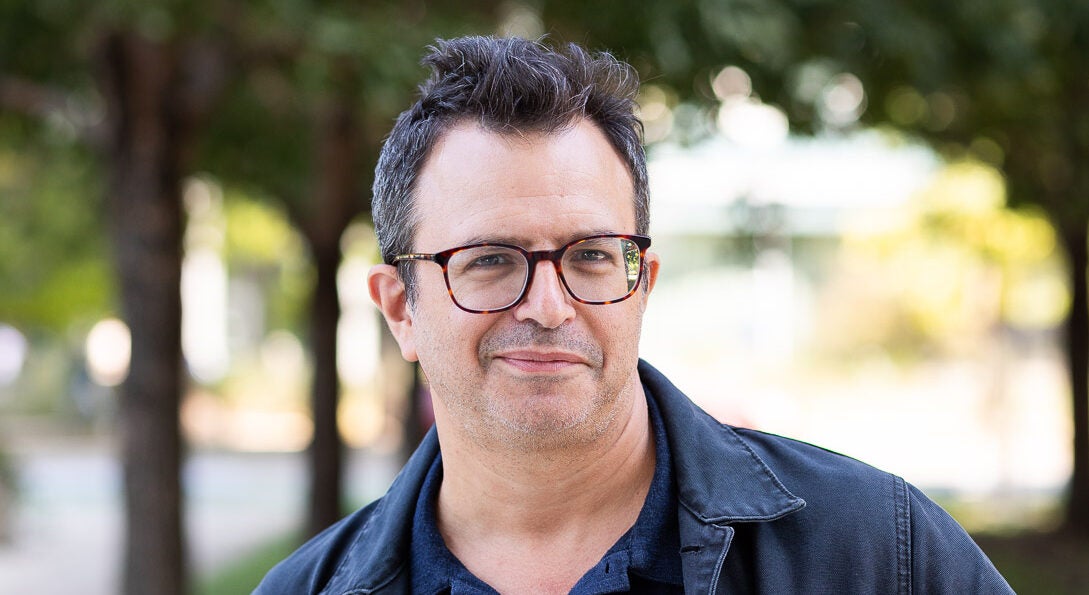How ‘Art, literature, and ideas change people’s lives,’ an Interview with Poet, Translator and LAS Associate Professor Daniel Borzutzky

Interview with Daniel Borzutzky
Name: Daniel Borzutzky
Title: Associate Professor
Department: English and LALS
Tell me a little bit about your history at UIC/LAS:
I started teaching at UIC since 2018. I teach courses in Creative Writing, Literature, and Latinx and Latin American literature and culture. I’ve helped to develop the Center for Latinx Literature of the Americas, a programming center for literature and art of the Americas, and I work on the Crossing Latinidades initiative to support graduate students throughout the country who are working in Humanities disciplines at other public R1 HSIs.
What role does research and furthering your own education play in your career?
My “research” is writing and artmaking: poetry, fiction, and translation. And being a writer and artist means putting art and writing at the center of your life and it means that you see the world through the lens of art and writing and translating. It’s a joy and privilege that I get to make a living this way. And it means that I’m always writing, reading, studying, trying to learn how to continue to keep writing and artmaking at the center of my life.
What interests you about Liberal Arts and Sciences?
Art, literature, and ideas change people’s lives. As a teacher of writing and literature it’s really important to remember this and to remember that the encounters students have with the things they read and experience in your classes can be powerful and transformative in ways that we do not always get to see.
How do you prepare students for their future careers?
On one level, teaching students how to read, write, and think is an invaluable career skill. On another, I am always happy to talk over an ongoing period of time with students about the logistics of jobs, careers and what they may end up doing after they graduate. On a third level, students who encounter literature and books that have changed them will likely bring to whatever lives they pursue a set of ideas and perspectives, aesthetic and intellectual sensibilities, and appreciations for difficulty and ambiguity that may very well help them survive and see alternative ways of understanding and coping with the grind of a difficult and stressful career.
Advice for new students?
Get to know your teachers. They want to be helpful and you never know what might come out of the conversations and connections you have and make with them.
You recently released a poetry collection, The Murmuring Grief of the Americas, can you talk more about this work and what it meant to you to write it?
At the end of my last book, Written After a Massacre in the Year 2018, one of the final poems poses the question: How do we quantify the murmuring grief of the Americas? The Murmuring Grief of the Americas began as an attempt to answer that question: How do you quantify the murmuring grief of the Americas? And the book continues to write scenes that take place on the invented shores of Lake Michigan (as in my previous three books); As in previous books, I continue to obsess about the intersections of capitalism, state violence, and migration.
What is it to be human? How is our human-ness or humanity a performance? These are continued obsessions, along with: how does financialization function, especially in relation to natural disaster? What is debt and how does it determine who we are? How do migration, language discrimination, xenophobia and hatred sink into the smallest corners of our language? What can poems do? What makes us laugh? How do we survive? Why do I love the word “murmur,” with its repetitions and the many sounds and words contained it? But also: what is a book? What does it do? Who is it for?
In addition to your work as a poet and writer, you’ve translated a number of texts as well. What does it mean to you to be able to help bring writing to new audiences through translation?
A commonly circulated statistic is that less than three percent of books published each year in the U.S. are works in translation. Translators do the vital work of putting anglophone readers into contact with cultures and literary practices that they would otherwise not get to experience. In a city of migrants, like Chicago, the work of translators carries an even deeper resonance as it centers multilingualism as a reality that is already present in the lives of so many of our students, and of so many people in our city and nation. Translation has also meant that I have been in conversation with writers from throughout Latin America, and this has been life changing, both for my writing and for the relationships I have developed.